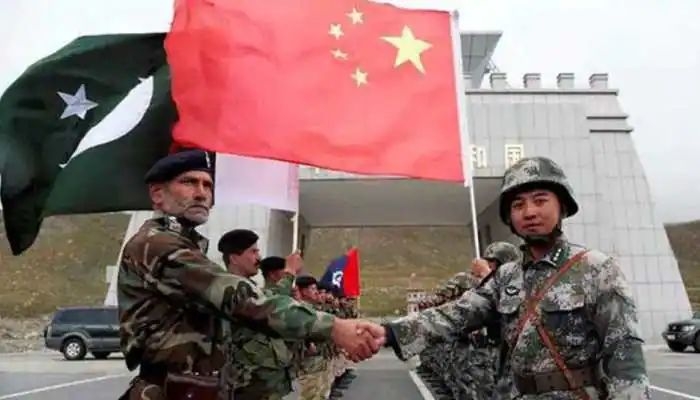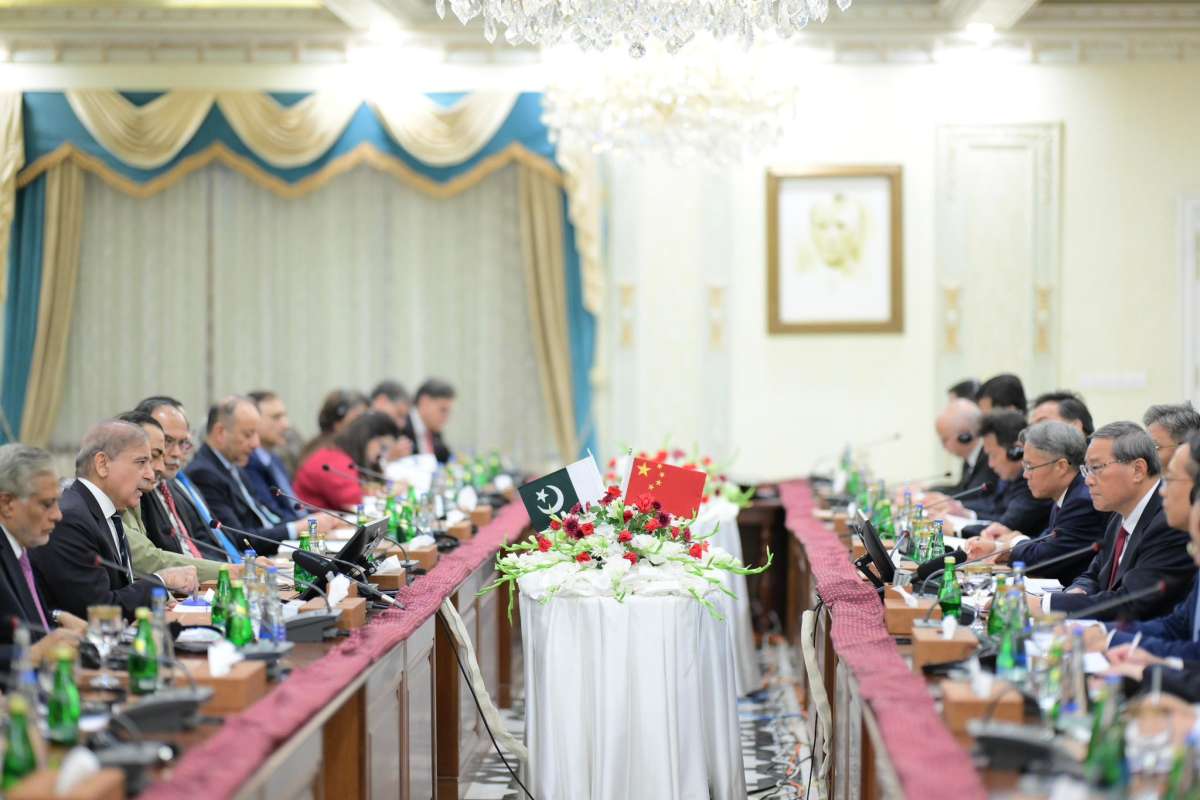The inability to guarantee the safety of foreign nationals complicates Pakistan’s diplomatic position and raises concerns about the Army and ISI’s ability to address internal security threats effectively….reports Asian Lite News
Chinese Prime Minister Li Qiang is believed to have raised Beijing’s strong concerns over the security of its nationals in the country during his ongoing visit to Islamabad – the first by a Chinese premier to Pakistan in 11 years – for the 23rd SCO meeting of Heads of Governments (HOG) that kicks off on Tuesday.
Two Chinese citizens lost their lives in a recent suicide bombing aimed at their convoy close to Karachi’s airport in Pakistan. This attack also resulted in injuries to several Pakistani police officers who were providing escort to the convoy, raising significant concerns regarding the efficacy of the security measures enacted by Pakistani authorities.
The Baloch Liberation Army (BLA) claimed responsibility for the incident, highlighting a disturbing pattern of violence directed at foreign nationals engaged in China-funded initiatives. The event occurred just days prior to Pakistan hosting an important meeting of the Shanghai Cooperation Organization (SCO), underscoring the persistent security challenges that jeopardise not only foreign investments but also regional stability.

The suicide bombing took place in a crowded area adjacent to Karachi’s airport, a site that should have been under stringent surveillance. Eyewitness testimonies depict scenes of disorder following the explosion, highlighting significant failures in the security protocols intended to safeguard foreign nationals.
Despite substantial military and intelligence assets, the Pakistan Army and the Inter-Services Intelligence (ISI) have consistently been unable to avert such attacks. Their preoccupation with geopolitical strategies and internal power struggles frequently overshadows the urgent necessity to guarantee the protection of foreign nationals and vital infrastructure.
The ongoing targeting of Chinese nationals raises significant concerns regarding the capability of the Pakistan Army and ISI to ensure security. For years, these agencies have promoted their competence in managing insurgency and safeguarding foreign investments; however, the increasing frequency of attacks indicates a serious misjudgment of the threats posed by organisations such as the Baloch Liberation Army (BLA).
This is not the first occurrence of violence directed at Chinese nationals in Pakistan. The BLA has a well-documented history of targeting Chinese workers, underscoring a troubling trend that reflects not only local discontent but also a systemic failure to safeguard foreign interests.
The ongoing violence against Chinese nationals presents significant threats to Pakistan’s economic prospects, especially concerning the China-Pakistan Economic Corridor (CPEC). The inability of the Pakistani Army to secure these initiatives raises concerns among investors regarding the safety of their capital, ultimately jeopardising the economic stability that the government aims to achieve.
The timing of the attack was particularly alarming, as Pakistan was scheduled to host a meeting of the Shanghai Cooperation Organisation (SCO), which kicked off in Islamabad a week later. The inability to guarantee the safety of foreign nationals complicates Pakistan’s diplomatic position and raises concerns about the Army and ISI’s ability to address internal security threats effectively.
International responses to the attack have been prompt, with numerous countries denouncing the violence and expressing solidarity with both Pakistan and China. Nonetheless, the persistent failure of the Pakistan Army and ISI to safeguard foreign nationals raises concerns among international stakeholders regarding Pakistan’s reliability as a partner.
China’s reaction will also be under close scrutiny. As a significant player in Pakistan’s economic environment, Beijing has a vested interest in ensuring the security of its investments. Increased pressure from China on the Pakistani government could necessitate a reassessment of military priorities and resource distribution.
Strategic subordination
It is highly unusual for a sovereign state to allow another state to establish a security apparatus, even if it is a joint arrangement, within its territorial boundaries. Such an agreement inherently implies a profound dysfunction or incapacity within the host state’s security framework – specifically, its national military – and represents a deliberate compromise of its sovereignty.
The reported success of China’s coercive diplomacy in persuading the Pakistani government to authorise the formation of a joint security force on Pakistani soil, ostensibly to protect Chinese interests and personnel, highlights the ongoing entrenched practices within Pakistan, particularly regarding the pervasive influence of the Pakistan Army.
A recent report by Nikkei Asia titled ‘China eye security tie-ups after deadly militant attacks’ indicates that the Pakistani government has consented to a bilateral agreement facilitating the establishment of joint security companies with Beijing, thereby officially allowing Chinese security officials to operate within Pakistan’s borders.
The report further reveals that this arrangement would enable these forces to transport Chinese nationals in armoured vehicles as part of the security measures. This development not only marks a significant departure from previous frameworks governing Sino-Pakistani relations but also constitutes a direct infringement on Pakistan’s sovereignty, sanctioned by the very institution tasked with its defence—the Pakistan Army.
Moreover, this arrangement highlights China’s apparent lack of confidence in the Pakistan Army’s ability to adequately protect its personnel, infrastructure, and strategic interests amid an increasingly deteriorating security environment that has repeatedly targeted Chinese nationals and projects in recent years.
Pakistan has experienced a marked escalation in terrorism-related incidents in recent years, significantly undermining its internal security. Despite conducting thousands of intelligence-based operations (IBOs) across the country’s hinterland, the Pakistani security establishment has struggled to contain the violence.
Data from the Islamabad-based Centre for Research and Security Studies (CRSS) reveals that the country recorded nearly 500 terrorist attacks in the first six months of 2024 alone, resulting in more than 800 fatalities, primarily among its security officials.
However, what is particularly notable is the discernible increase in the targeting of Chinese personnel and China-affiliated projects, especially within the provinces of Khyber Pakhtunkhwa and Balochistan. Both of these provinces have been epicentres of protracted insurgencies for decades, challenging the Pakistani state’s authority over their lands.
In recent years, relations between Islamabad and Beijing have significantly deepened, with China’s presence rapidly expanding across Pakistan, primarily under the China-Pakistan Economic Corridor (CPEC), a flagship initiative of the broader Belt and Road Initiative (BRI).
This growing Chinese footprint includes not only extensive infrastructure projects but also considerable involvement in the extraction of Pakistan’s natural resources, particularly in the mineral-rich province of Balochistan.
This increased Chinese engagement, especially in resource extraction, has intensified local grievances, as the local populations remain marginalised and deprived of basic amenities and essential services, escalating tensions and fuelling discontent in an already volatile region.
Consequently, China is perceived as a direct beneficiary of Pakistan’s exploitation of Balochistan’s mineral resources and is thus seen as complicit in exacerbating the hardships faced by the local people.
In March of this year, Pakistan faced a series of significant attacks within a single week, all explicitly targeting Chinese interests and nationals. On March 20, the Balochistan Liberation Army (BLA) launched an assault on the heavily fortified Gwadar Port Authority Complex in Balochistan.
This complex houses the offices of port officials alongside commercial spaces. Gwadar port is considered a key project within the $65 billion China-Pakistan Economic Corridor (CPEC) initiative, serving as a symbolic and strategic nexus for Chinese investment in the region.
The insurgents’ ability to penetrate deeply into the complex revealed critical vulnerabilities within Pakistan’s security framework. Following this, on March 25, Baloch insurgents attacked the Pakistan Naval Station (PNS) Siddique base in Turbat, claiming it was a response to China’s expanding presence in Balochistan.
However, the most significant attack occurred on March 26, 2024, when a suicide bomber targeted a convoy transporting Chinese workers near Bisham city in Khyber Pakhtunkhwa’s Shangla district. The convoy was en route to the Dasu hydropower project, which is being constructed by a Chinese company in the Upper Kohistan district.

It is worth noting that nine Chinese nationals were killed in a similar incident in Dasu in 2021 when a bus carrying Chinese workers was attacked by a suicide bomber. These incidents highlight the ongoing security challenges faced by Chinese projects and personnel, as well as the Pakistani government’s failure to address such threats effectively.
The loss of Chinese lives prompted a notable shift in Beijing’s stance; Chinese officials began openly criticising the Pakistani government for its inability to protect Chinese nationals and its critical infrastructure projects within the country.
On March 27, China’s Foreign Office issued a strongly worded statement urging the Pakistani government to “thoroughly investigate the incident as soon as possible, hunt down the perpetrators, and bring them to justice.”
This diplomatic rebuke underscored Beijing’s growing frustration with the deteriorating security situation in Pakistan, with senior Chinese officials like Liu Jianchao, Minister of the International Liaison Department of the Communist Party of China (CPC), continuously pressing Islamabad regarding its failures to tackle the escalating threats to Chinese interests.
The repeated and monumental failures of the Pakistani state to safeguard Chinese nationals and protect the strategic CPEC projects, coupled with the escalating debt obligations owed to Beijing, strongly suggest a substantial erosion of Pakistan’s sovereign decision-making capacity.
A salient example of this dynamic can be observed in the lead-up to Prime Minister Shehbaz Sharif’s visit to China in June 2024. Beijing reportedly set explicit preconditions for the visit, contingent upon Islamabad’s commitment to launch a comprehensive military operation akin to the 2014 Zarb-e-Azb campaign.
In compliance, the desperate Pakistani government announced “Operation Azm-e-Istehkam” within two weeks of Sharif’s return from China on June 22, a move that was met with approval from Chinese officials.
Furthermore, Liu Jianchao, a senior Communist Party official, was stationed in Islamabad ahead of this development, emphasising in an all-party gathering on June 21 that a growing ‘internal security deficit’ constituted a major threat to Beijing’s CPEC cooperation with Pakistan and hence required urgent attention from the Pakistani government.
This sequence of events vividly illustrates the extent of China’s leverage over Pakistan and, conversely, the significant decline in Pakistan’s autonomous decision-making apparatus.
In this context, alongside reports of Beijing’s ongoing pressure on Islamabad to cede operational control of Gwadar Port to the Chinese navy for establishing a military base, and the recent “agreement” allowing Chinese security personnel to operate within Pakistan’s borders, the increasing entanglement of foreign influence in areas traditionally reserved for sovereign authority becomes increasingly apparent.
These developments raise serious concerns about the erosion of Pakistan’s national sovereignty and the broader implications for its governance and autonomy.
ALSO READ: Tibetan activist calls out China’s illegal sand mining












